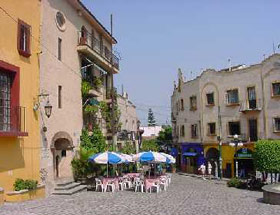 |
 |
 |
 News Around the Republic of Mexico | March 2005 News Around the Republic of Mexico | March 2005  
Zacatecas State Economy Tied to Aid from US
 Wire Services Wire Services


| Some say that the main role of the state government is to undertake public works in the communities across Zacatecas.

|
Without the financial help provided by Mexicans from the state of Zacatecas living in the United States, numerous social projects being carried out in their home communities in north-central Mexico, not to mention their home state's overall economy, would suffer greatly.

So says Miguel Moctezuma Longoria, a research professor at the Universidad Autonoma de Zacatecas, about the socio-economic power of his state's citizens living abroad.

"They form part of the plans and programs of Zacatecas, not because the state incorporates them in a direct way, but because they have the capacity to negotiate community projects that require social spending and that implies that they are involved in community development projects," Moctezuma said in an interview with EFE.

The professor said that the more than US500 million that Zacatecans send home each year in remittances is vital because no state activity generates as much income, "more than a million dollars per day."

He emphasized that the biggest industry in Zacatecas is, without doubt, the export of migrants to the United States.

Official statistics show that Zacatecas has a population of somewhat more than 800,000, the same number of its citizens that live in the United States, not counting a similar number of persons born to Zacatecan parents across the northern border.

Fernando Robledo Martínez, the director of the state's Migration Institute, said that the state government feels it is paramount to maintain contact with Zacatecans in the United States.

"Although the agricultural and mining sectors continue to be important sources of income, remittances (are) a direct benefit to families (here) and help support the economies of many communities, municipalities and districts within the state," he said.

Some say that the main role of the state government is to undertake public works in the communities across Zacatecas.

However, in practice that does not happen and it is the clubs formed by Zacatecans in the United States numbering from 180 to 200 members that directly support the various projects in their respective home communities.

Moctezuma said that the club phenomenon is the realization of a group of people that via social works linked to cultural and civic life abroad provides part of the means whereby they recreate their roots outside the borders of their state.

"Even though they're abroad, they still behave as if they were in Zacatecas and their experience on the organizational level has brought them far, even to the point of creating collective investment programs," he said.

Moctezuma added that the Zacatecan group phenomenon began in the 1950s and 1960s with investments in community projects or collective remittances sent back to Mexico, and since then a program has arisen among migrants to invest in their home communities without the participation of the government.

"Right now, there are still many immigrant organizations that are not registered at the country's consulates. That means there's intense activity and a large part of what they do doesn't depend on the Mexican government," he said.

Robledo, for his part, confirmed that it was about 15 years ago that the state government began creating mechanisms to build links with Zacatecans in the United States. The programs led to civil and social protocols to collect funds for various local programs.

The example of the investment programs, which started among Zacatecans abroad, now has been copied in 22 of Mexico's 31 states.

Zacatecans in the United States mainly live in the California cities of Los Angeles, Pasadena and Norwalk, in Chicago, and in the Texas metropolises of Dallas, Ft. Worth and San Antonio. | 
 | |
 |



